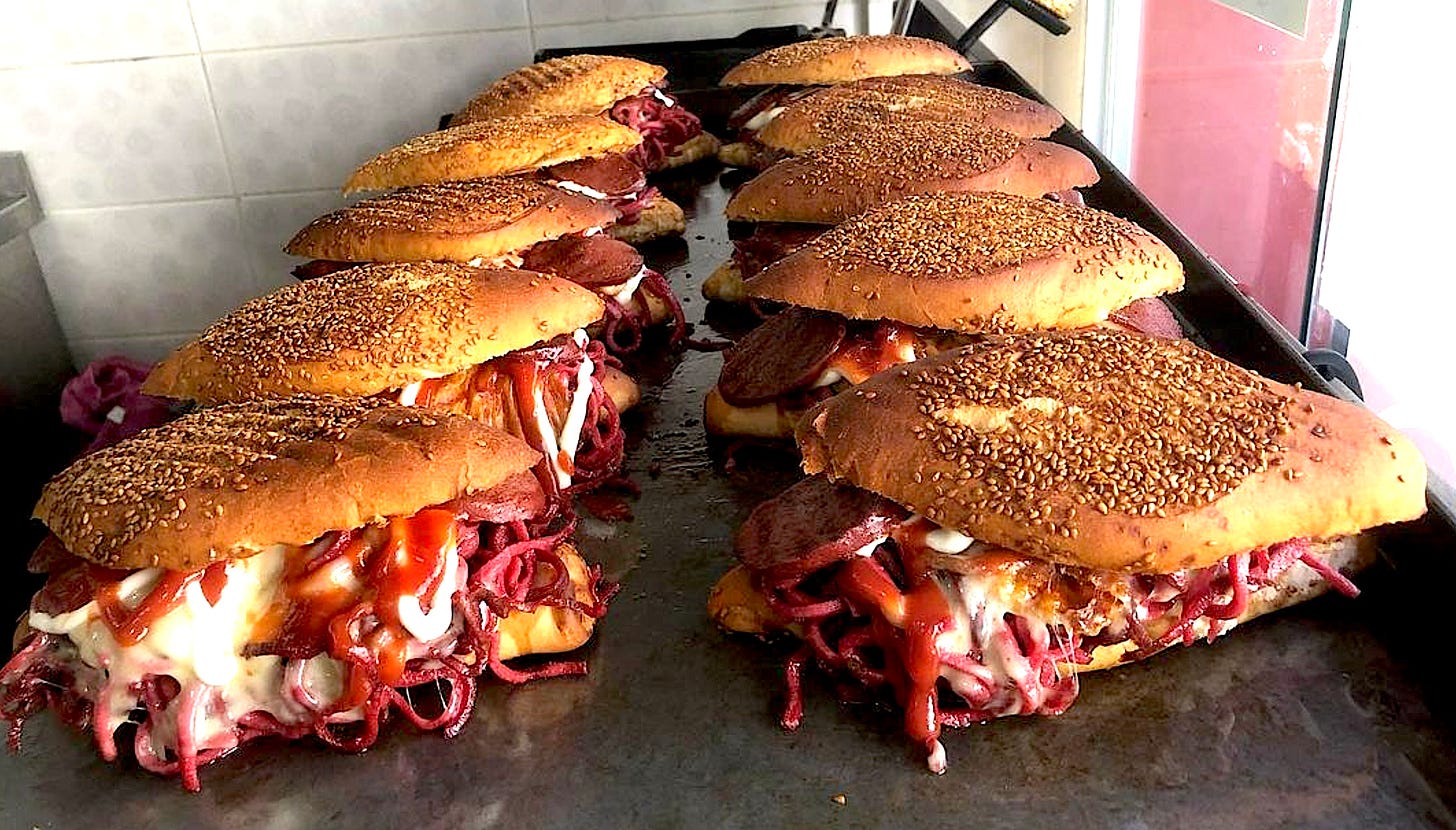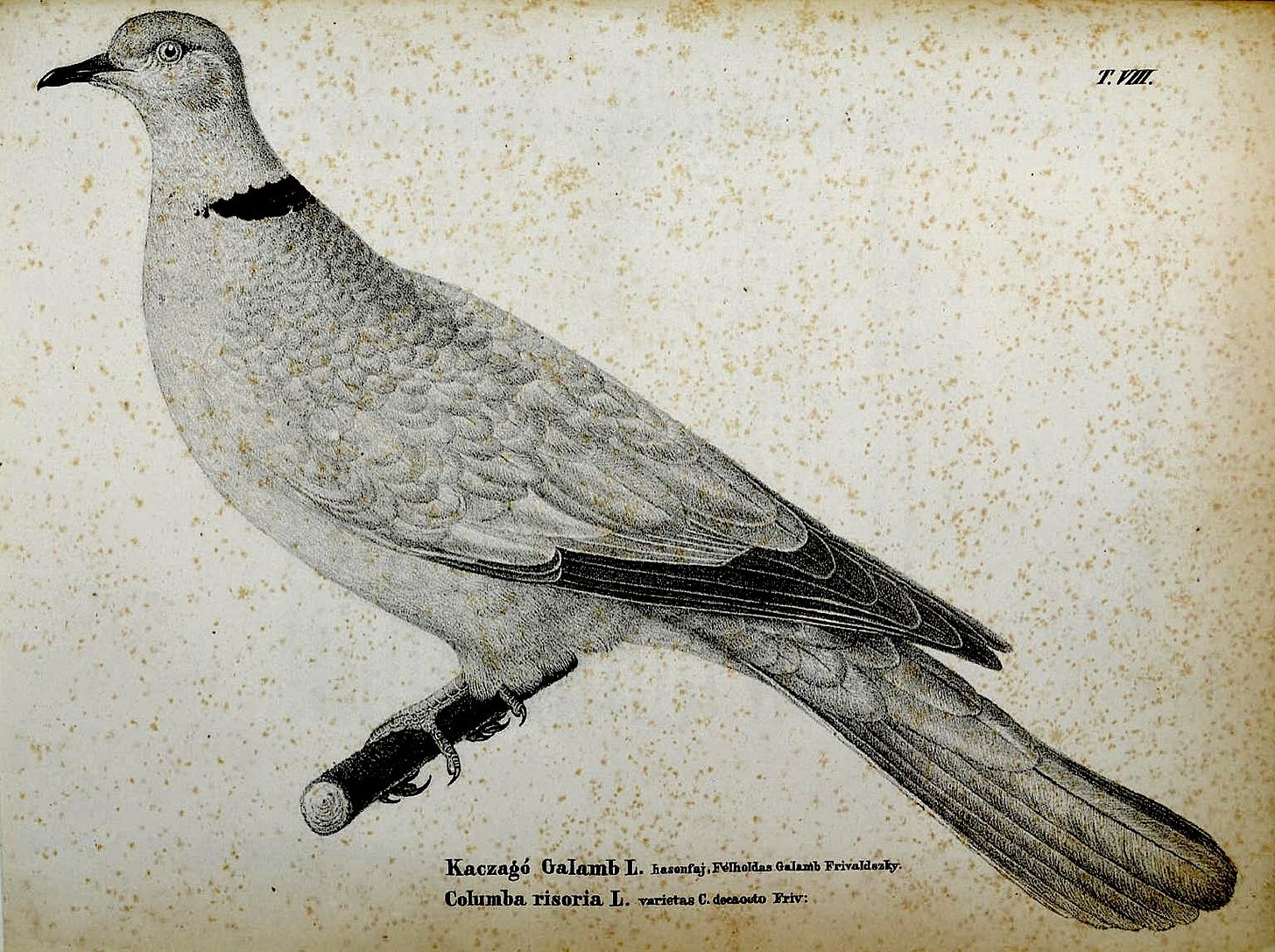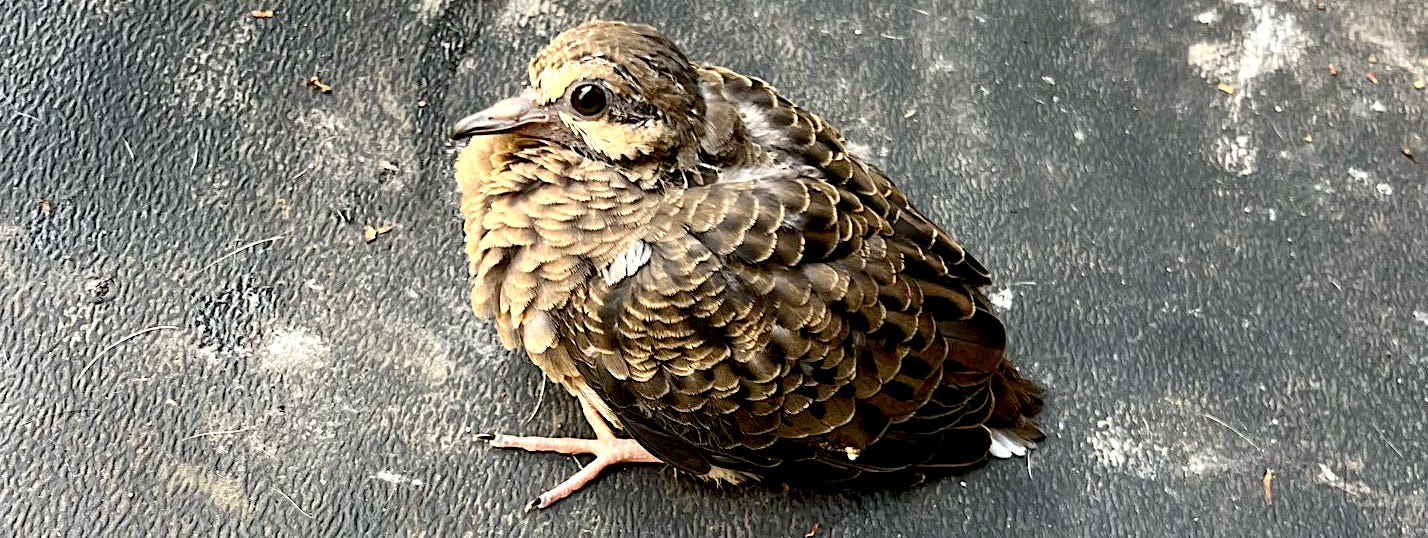Notable Sandwiches #104: Kumru

Welcome back to Notable Sandwiches, the feature where I, alongside my editor David Swanson, plunge into the strange waters of Wikipedia’s List of Notable Sandwiches, in alphabetical order. This week, a Turkish treat: the kumru.

First things first, as they rarely are in this series: the kumru is a delightful Turkish variant on the grilled cheese—although, in this case, it is the cheese itself that is grilled. Sometimes called a Çeşme Kumrusu, the sandwich includes the aforementioned cheese (usually sharp kaşar), tomato, and a specialized ovoid chickpea-sourdough bun topped with sesame seeds. Optional but frequent toppings are griddled ribbons of spicy garlic sausage called sujuk (aka “meat spaghetti”); Turkish salami; green pepper; and pickles, served either atop the sandwich or as a side dish.
The sandwich originated in, and is one claim to fame of, the seaside town of Çeşme, facing onto the crystal waters of the Aegean sea from the westernmost point of Anatolia. The bread, in particular, is an ingredient found principally in the Aegean-Mediterranean vicinity: its signature chickpea sourdough starter, baked into generously-seeded loaves, is known in Turkey as kumru, in Greece as eftazymo, in Cyprus as Arkatena. The Greek and Cypriot names are somewhat straightforward: eftazymo, means “to knead seven times”; arkatena comes from arktis, the Cypriot term for chickpea foam. The Greeks seem to have it right: by all accounts, the chickpea-fermentation-sourdough process is temperamental and tricky; one nineteenth-century author, the dashing yet ill-starred Archduke Ludwig Salvator, claimed in an account of his Ionian travels that “to make this bread successfully you needed a black-handled knife, a red blanket and a holy book.”
The Turkish name for this temperamental bread, however, goes full-on figurative, which is where things start getting interesting. Due to the distinctive, pinch-ended oval shape of the kumru’s loaves, the name means “Turkish dove”—a bright-eyed little bird also known as the “collared dove.”

While not literally a bird in a starched ruff (although that’s wonderful to contemplate), the collared dove is an Eurasian species that is one of the great migrants of the avian world. It looks quite a bit like a mourning dove in a kind of abbreviated clerical collar, there to minister to its (literal) flock. Known as a “colonizer” among bird species, the avian “kumru” leapt from Southeast Asia to Turkey to the Balkans, and thence throughout Europe and eventually to the U.S. Its scientific name—bestowed upon it by a nineteenth century Hungarian entomologist and sometime-ornithologist named Imre Frivaldszky—is Streptopelia decaocto, “Streptopelia” meaning “wearing a twisted metal collar or torc” in Greek, and “deca-octo” meaning “eighteen.”
The number, here, is somewhat mysterious. As is often the case in sandwich stories, I’m working from third-or-fourth-hand hearsay, across a few centuries and multiple languages. But I tracked down Frivaldszky’s paper from 1837, in which he describes having discovered the species in Phillipopolis (the ancient Roman name for the modern city of Plovdiv, in Bulgaria), and hearing the following story from villagers (Google-translated from Hungarian, subsequently cleaned up by me):
“A poor but pious girl came to serve a miserly woman; from morning to night she worked, yet had hardly a mouthful of bread, and she was scolded constantly; but her annual salary consisted of 18 pennies. Discouraged under the burden of her meager fate, she raised her burning prayers to the heavens from the bottom of her heart, in order to make the world aware of the unworthiness of her fate. Zeus took pity on her and turned her into a dove, which now, in a turban, announces this bitter fate to the world.”
The bird’s cry does kind of sound like “deca-octo” if you really strain to hear that. It’s a weird story, honestly—quite possibly the inhabitants of Plovdiv were messing around with the scientist in their midst. (Frivaldszky sounds like a cool dude, though—he loved cave diving, explored the Balkans, and discovered 126 separate species, plus had god-tier nineteenth century facial hair). But also…what is the deal with Greek gods transforming people into things as an answer to prayers? This lady wanted a raise, not to become a bird! Maybe she pecked out her shitty employer’s eyes. Who knows. Personally, I would be wary of praying to Zeus, especially as a woman; if he’s not turning you into a dove or flower or whatever, he’s probably gonna turn himself into a bull or a swan and then try to have his way with you. And then you have to wear a torc and coo forever and the Turks name a loaf of bread after you, and you still don’t get a raise! If only there had been a “Servants of Misers Union” and things could have ended very differently. On the other hand, this bird would likely have had a less colorful name.
The Sword and the Sandwich is a newsletter about deadly serious extremism and serious sandwiches. Please consider supporting this work with
a paid subscription.
Anyway, I was extremely grumpy all day for reasons unrelated to this column, and felt the shitty, ozonic, bad-air swelter of a New York summer in all its oppressiveness, and a curdled lump of despair in my chest and gut and I briefly thought I’d lost the ability to write. (It turned out the cure was to poke around in old source material and get very excited about it. It took me like two hours to find the Frivaldszky paper—I had to go through a brief English summary and then a chatty German compatriot of the entomologist first—and, incidentally, all the contemporary English sources about this bird say it’s an “ancient Greek myth” about the servant girl and her eighteen pennies. They are all wrong, because in fact it was a bunch of nineteenth century Bulgarians pulling the leg of a credulous Hungarian traveler).
But before my journey of discovery I had to sulk for like, fifteen hours. It’s part of the process. So there I was, sitting and smoking on my back steps, really working myself up into a good sulk, building up a weighty inner bulkhead of surliness, and suddenly something moving very quickly hits my shoulder and I scream and flail because I have the startle response of a frightened rabbit on meth, and then a tiny little bird falls over next to me, dazed. He’s hopping a bit but seems to be favoring one wing, which is deeply concerning, because my neighborhood is absolutely full of ravenous feral cats, rats, and other things hazardous to an injured bird’s health.
I take a (hot, gross) breath and start getting very upset that I’ve inadvertently caused irreparable harm. I certainly didn’t mean to, just reacting to a feathered projectile striking me at speed. I hop on the phone and first call Animal Control, which directs me to the Wild Bird Fund. This little guy is sitting next to me the whole time:

Just as I’m about to leave a message for the Wild Bird Fund and gather my broken-winged little buddy in a shoebox and drop him off at Columbus and 86th, I try giving him a little stroke on his little wing, and all of a sudden he flies away, beautifully, like a feathered dart. He just needed to catch his little breath.
It turns out he was a fledgling mourning dove—apparently they’re adorably mottled while they’re little and still figuring out how to fly, before becoming the smooth and elegant avians of adulthood. So there I was, brooding over dove-shaped bread. And I thought I killed a dove, and it turned out he was OK! He flew off like a shot. He’s figuring it out! Sometimes life just smacks you with a metaphor. Learning to fly is hard. Even Simone Biles, the greatest gymnast in history, lost herself in the air once on the way to a towering height. But in the end she came up golden. Our little dove is going to be OK.
And so am I. And so are you. And I really want a chickpea loaf full of grilled Turkish cheese, and meat spaghetti, and tomatoes. But I’m not going to complain about it too loudly, because I’m worried some errant god will turn me into a bird whose call sounds faintly like “sandwich!” and a Balkan ornithological anthropology moment will ensue. I can’t risk it! From now on, I will not mourn my fate so bitterly. After all, I didn’t lose my ability to write, as I’d feared. The words are still here, numerous as sesame seeds on the top of a perfect, dove-shaped bun.

Add a comment: